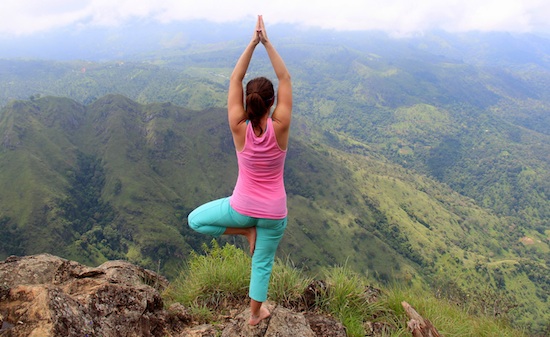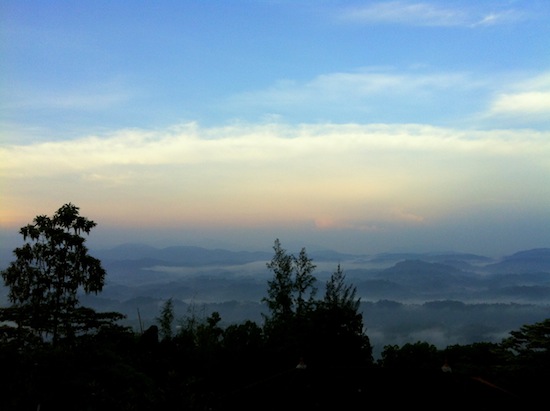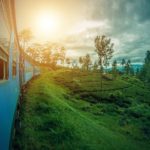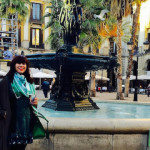10 Days Away from the World: Vipassana Meditation in Sri Lanka


Now imagine the longest you’ve ever sat still, the longest you’ve ever gone without speaking or making eye contact, the longest you’ve gone without reading anything. Imagine sleeping on a very thin cushion on top of a wooden board for ten nights; eating two vegan meals a day and not eating anything after noon; getting so accustomed to waking up at 4 a.m. and using a squat toilet that you come to prefer it.
I recently completed my second ten-day vipassana meditation course (if you’ve never heard of vipassana, I encourage you to read the ‘Vipassana’ entry on Wikipedia before reading further!) Since sitting my first 10-day course in Sri Lanka a year and a half ago, I’ve attended a three-day course in Blue Ridge, Virginia, and have tried hard to maintain my habit of meditating daily. I was pretty nervous before beginning this second 10-day course, but once I got to the rolling hills of Kandy, I knew I was exactly where I needed to be.
Day Zero.
Upon arriving at the meditation center, I notice that quite the international crowd has joined for this course. There isn’t much time for small talk before Noble Silence begins (which entails no talking, reading, writing, or communicating of any kind for the duration of the course) so I can’t ask anyone where they’re from, which I know means I’m going to spend the next 10 days superficially guessing nationalities based on physical appearances and clothes.
Which is exactly what I did, but I’ll spare my readers the suspense: of about fifty meditators, there were men and women from Scotland, Italy, Norway, Finland, Sri Lanka, India, Canada, Russia, Macedonia, and the U.S. Many had come just for this course; some had quit their jobs and were seeking peace and quiet; others were experienced meditators; still others had been traveling the world for years and just sort of ended up here in Sri Lanka for a little while.
Needless to say, when we were all allowed to talk again on Day Ten, I had many inspiring conversations with some very interesting people.
Before going to bed on the first day, I reacquaint myself with the vipassana schedule, the same schedule that is followed by all vipassana course attendees, all over the world:
4:00am Morning wake-up bell
4:30-6:30 Meditate in the hall
6:30-8:00 Breakfast & rest
8:00-9:00 Group meditation in the hall
9:00-11:00 Meditate in the hall (old students may meditate in cells)
11:00-1:00pm Lunch & rest
1:00-2:30 Meditate in the hall (old students may meditate in cells)
2:30-3:30 Group meditation in the hall
3:30-5:00 Meditate in the hall (old students may meditate in cells)
5:00-6:00 Tea break
6:00-7:00 Group meditation in the hall
7:00-8:15 Teacher’s discourse in the hall
8:15-9:00 Group meditation in the hall
9:00-9:30 Retire to room; lights out
Day Two.
This is hard. Even though I had a good idea of what to expect, it’s hard. It’s hard not communicating; it’s hard coaxing my mind back to the present moment when it’s off dreaming and planning and creating; and it’s hard not moving a muscle during a two-hour sitting. Most of all, though, it’s hard feeling this light. Don’t get me wrong – it feels incredible, and I can’t remember the last time I felt this refreshed. But letting go of worries, anxieties, negative feelings of all kind… good or bad, it’s hard to let go of things we’ve become attached to. It’s hard to let yourself feel light.
Teacher calls it “mental surgery.” I call it “mental bootcamp,” or on the days when I’m feeling lighter and more positive, “mental spring cleaning.” I guess it’s all of these things. As I meditate, I can feel my mind becoming clearer. But it’s tough and painful at times, and there are moments where I wish I could be curled up in my big bed in Colombo (where I’ve lived for the past seven months), eating pizza and reading a book. But I’m here for a reason, because deep down I need and want to be here, and I’m not a quitter. And I know from experience how great I’ll feel by Day Ten, and so I continue working.
Day Four.
When your mind is quiet, you pay more attention to everything. You stop walking to watch the clouds part after the afternoon thunderstorm, pausing to appreciate the sun setting in its humble, glorious way. You sit still long enough to realize that the crickets, who fill the balmy nights with their incessant chirping, are actually having a lively conversation that you can sort of follow, if you listen really closely. When your mind is quiet, the little things matter more. The bright orange of the monk’s robes.
The 45 minutes after breakfast that quickly, easily become blissful nap time. The Werther’s Original caramel that is placed next to your evening cup of tea on Day Three, giving you a tiny piece of home at a time when you feel the farthest from home you’ve ever felt. And, my favorite, the fact that oh! today is an even day (shower day) and tomorrow will be an odd day (change underwear day, since you failed to bring enough pairs and you gotta ration somehow).
One of my favorite phrases, “It’s all about the little things,” takes on a whole new meaning with every passing day of this course so that by Day Ten, I’m so very appreciative of the thriving colony of ants that has taken refuge in the corner of my room because they, too, have a place to sleep at night.
Which brings me to the feeling of going a little crazy here.
Which brings me to the feeling of going a little crazy here. But I think you know your meditation is going well when you feel a little crazy, because you truly get outside of yourself – it’s not about you anymore. As an old student (defined by having done at least one 10-day vipassana course), I now have the option of meditating in what’s called a ‘cell,’ a very small private room surrounded by other tiny meditation cells near the main meditation hall. (I wish they didn’t call it a cell, because it automatically makes me think of a prison cell, but it is what it is.)
I’ve been assigned Cell #3. Cell #3 has a bright blue meditation cushion, a little light bulb (which I never turn on because the light it emits is awful), and is brimming with complete silence. The cells around me are also occupied by old students, and so it’s eerily quiet in these cells, which makes it easier to mediate, but also drives you crazy after a while and has you missing the birds and the clearing of throats and the far-away music coming from the ice-cream-man’s tuk tuk.
10 Days Away from the World: Vipassana Meditation in Sri Lanka
But with that quiet comes the good stuff. The silence makes it easier to remember why I’m here, what I’m practicing, why I care about this stuff and how it fulfills me. To practice vipassana is to observe things as they really are (as opposed to how they may appear or how one may want them to be). To truly understand vipassana meditation, one must observe it at the most basic, experiential level–through the framework of the body. Vipassana is observing, experiencing, and ultimately understanding the constant changing nature of both the physical and mental structures. This is what I’m being reminded of. This is what I am re-learning.
Day Five.
Theoretically, we all understand constant change. Rushes of emotions; stages of a relationship; life itself. On the surface level, we grasp impermanence–we know that anger and sadness fade away, that people and pets die and don’t come back. But we are creatures of habit, creatures of reactions, and while on some level we may “get” that old proverb, “No man steps in the same river twice, for he is not the same man and it is not the same river,” it’s very difficult to truly know this on the experiential, primal level.
Vipassana meditation in Sri Lanka teaches us to simply observe the ever-changing sensations constantly occurring in our body, to experience them but not react to them. Only then can we slowly come to a true understanding of impermanence, which is, I think, the ultimate law of nature. And only then can we accept the ephemeral nature of everything in life with peace, instead of with bitterness and misery.
Does that sound “so Buddhist” or what? Vipassana, an ancient form of meditation, has Buddhist roots, but is nonsectarian and is practiced by people of all faiths, all around the world, every day. That’s one huge reason I love it–it’s not a religion, it’s a way of life, no matter what god you pray to (if any) or what kind of afterlife you believe in (if at all). I enjoy the physical act of meditating, but I also enjoy making connections between the practice of vipassana and how it applies to nature, to human habits, to our intellectual understandings of change, peace, and harmony.
There is a lot of truth here, in the meditation hall, in this practice.
Practicing vipassana is my way of taking a big idea (or many) off the shelf and playing with it in my hands, tossing it gently to and from while I observe it. I don’t like just staring up at ideas or beliefs high up on an imposing shelf. I like to grapple with them, hold them up to the light, come to my own personal and individual understanding of what it is and what it means and how I experience it and relate to it.
That’s what vipassana is to me. It’s the ladder taking me up to that shelf of ideas and theories and all the things I need to experience and grapple with before I can accept them. There is a lot of truth here, in the meditation hall, in this practice. “The nature of seeing things as they truly are.” That’s powerful.
Day Eight.
I can’t stop smiling. I literally have to come up with reasons to thank the volunteers serving us just so I can have someone to make eye contact with and smile at. (“Thank you for the water,” I whisper, because we are allowed to talk to the servers if we need to. “Thank you for offering up your time to serve us.” “Thank you for holding the door open for me on Day Six.”) I am genuinely happy. And it’s a powerful feeling, this happiness, because it’s coming from within. I am cultivating it, not reacting to something making me feel this way.
It’s amazing, once you think about it, how much we rely on external things to make us happy. But we are in control of our emotions, we get to choose our attitudes and how we feel about things, and it’s so easy to forget that in everyday life. Vipassana doesn’t directly teach cultivating happiness – I think it’s a byproduct of going within yourself, exploring under the surface of the mind, peeling back the layers. It comes with purity. And it feels incredible.
Day Ten.
I’m an emotional, spiritual, romantic person. My head isn’t always in the clouds, but more often than not, I’m dreaming or wondering about something. My heart, not my head, has the final say on most matters; I am hopeful and idealistic to a fault. And when I seek advice or words of wisdom, I usually go to my external world for truth and counsel, not my internal one.
Vipassana is objective observation. It is not at all intellectual (in its practice, at least). It is no cravings and no aversions; and it teaches you NOT to react to things you are feeling. In fact, it is so completely different from the way I live my life, so seemingly out of line with my habits and aspects of my personality, and yet it is one of the most fulfilling and satisfying things I’ve ever come across.
That physically manifests itself on Day Ten, at 9:42 a.m, when noble silence is lifted and we all stand up from our meditation cushions and walk out into the morning. Everyone is smiling; many have tears in their eyes. We walk around bowing our heads to each other, saying “May you be well and happy.” I walk up a path near the meditation hall and sit for a while, taking in the beautiful scenery.
10 Days Away from the World: Vipassana Meditation in Sri Lanka
In a little while, I’ll go collect my cell phone from the office and call my boyfriend, grinning nonstop when I hear his voice. I’ll enjoy my simple rice and curry lunch over conversation with an Italian girl my age who left Milan with her boyfriend on a motorbike two years ago (they plan on returning to Italy to live “when the country has money again.”) I’ll take a short nap and return to the hall for afternoon meditation and the final evening discourse.
Before bed, I’ll call my parents, and my mom will start filling me on everything that’s happened with the Boston Marathon bombings until I tell her I can’t handle all that awful news right now because my mind is so delightfully empty and I need to be selective about what I first start filling it back up with. The next morning, I’ll say my goodbyes and head back to Colombo, getting a headache from all the noise and heat and chaotic streets. I’ll arrive home to happy housemates, a dirty kitchen, and over a hundred emails.
But the lightness will last; the happiness will remain.
But the lightness will last; the happiness will remain. A week later, my head is less empty but more calm, my thoughts more steady, my reactions more intentional. And I’ll realize, for the hundredth time, why I keep coming back to this, why vipassana is something that’s becoming a big part of my life. Because we all need a little quiet time, a chance to get away from it all. Because in our crazy, busy, exciting, boisterous, demanding, productive lives, we all need a chance to disconnect from the external world in order to reconnect with our internal one.
For more information on vipassana and to sign up for a course, visit www.dhamma.org. Photos by Natalie Lampert.










I need vipasna how I will collect the form ?
Thank you for the post. Was a pleasure to read. I’ll be there in Feb 2017.
Wow, thank you very much for your post! Going there in August 🙂
Hi there,
Thanks for the details of your experience. I am planning to sit in for the second 10-day in Sri Lanka next month and debating whether to choose the Colombo or the Kandy location. Any suggestions?
Thanks,
Emma
I really enjoyed this post. It made me feel the emotion of your journey. I’m happy that you got the tools you needed to manage life in a calmer mind. Thank you for this post.